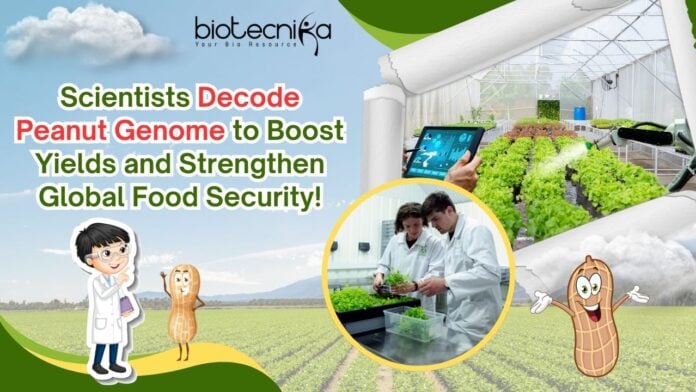Scientists Decode Peanut Genome to Boost Yields and Strengthen Global Food Security
How much significance does a Peanut hold in your lives? You might think that Peanuts are small and just some random crop, but their Genetic potential is way more than small and insignificant. In an innovative step towards Agricultural Science, a team of 19 global Researchers from China and Australia has deciphered the complicated Genome of this small legume, showing the way for stronger plants, more resilient food systems, as well as larger harvests.
This incredible Research was published in a prestigious journal, “Nature Genetics.” The Research highlights the most comprehensive ‘Peanut Pan-Genome’ to date, an innovative tool that would transform Peanut breeding as well as boost Agricultural productivity globally. This research is highly beneficial to countries such as India, where Peanuts hold a substantial economic as well as nutritional value.
What Is a Pan-Genome and Why Does It Matter
The Researchers developed a pan-genome of Arachis hypogaea L. (Peanut), a cumulative of all the Genes present across various accessions of the Peanuts. Unlike a single reference Genome, a Pan-Genome has both variable Genes (Genes present in only some species) as well as core Genes (Genes present in all species). This allowed for a detailed as well as dynamic representation of Peanut’s Genetic diversity, important for gaining knowledge on traits such as crop yield, peanut seed size, disease resistance, as well as climatic resilience.
For this incredible research, they used eight high-quality Genome assemblies, which represented diploid as well as tetraploid wild Peanut species, along with cultivated varieties. This method enables researchers to capture a full evolutionary and Agronomic snapshot of the Peanut Genome.
Scope of the Study: 269 Peanut Accessions
The researchers analyzed “269” Peanut accessions, such as improved modern cultivars, wild species, and conventional landraces. These landraces refer to locally adapted conventional varieties selected by farmers over generations, and sometimes wild species, often harboring untapped genetic traits valuable for crop improvement.
This broad genetic pool allowed the team to trace the evolutionary trajectory of domesticated peanuts, identifying variations that influence traits such as seed weight and size, key indicators of peanut yield.
Structural Variations Hold the Key
Among all the most impactful findings was the identification of 1,335 structural variations (SVs) linked to peanut domestication and 190 SVs specifically associated with seed traits. These include large-scale genomic changes like insertions, deletions as well as rearrangements, often affecting gene functions or expression.
One of the most important discoveries was deleting the gene AhARF2-2, which usually plays a role as a negative regulator for seed growth. Its absence increases inhibitory controls on the genes, allowing for greater seed expansion. It plays major role in peanut breeding towards bigger as well as more nutrient-dense peanuts. This also provides a valuable molecular target for future peanut breeding with both CRISPR-based editing as well as traditional crossbreeding.
Why Seed Size and Weight Are Critical
Seed size and weight are not just physical attributes; they have a parapotional impact on market value, processing cost, and oil extraction efficiency. Bigger seeds typically contain more oil and protein, making them economically valuable. This crossbreeding is shaped by complex interactions among genetics as well as the environment, which is why genomic insights like these are essential for breeders as well as scientists.
India, which is known as the second-largest peanut producer, stands to benefit significantly from this research. This research will improve farmer incomes, reduce input costs, as well as contribute to national food security.
Scientists Decode Peanut Genome to Boost Yields and Strengthen Global Food Security
A Major Leap in Crop Breeding
Prof. Rajeev K. Varshney, a lead scientist from Murdoch University, highlighted that this research delivers the most detailed understanding of peanut genetic variation to date. He explained that their knowledge of the molecular mechanisms as well as evolutionary factors that influence peanut pod size and weight, used to be limited. This research offers the most comprehensive genomic variation resource of the globally important peanut as well as will be an invaluable tool for crop breeding efforts.
Till now, structural variations had remained underexplored because of the technical limitations. This research offers a strong foundation for next-generation precision breeding of peanut and other legumes.
Chinese co-lead authors Kunkun Zhao, Hongzhang Xue, and Guowei Li played a crucial role in genome mapping and data analysis. Their collaboration with different universities like Henan Agricultural University, Shanghai Jiao Tong University, and the Shandong Academy of Agricultural Sciences showcases the truly global nature of this innovation.
Implications Beyond Peanuts
While focusing on research, this study has broader implications. Structural variation is becoming a focal point in agricultural genomics because of its ability to explain complex traits missed by conventional sequencing methods.
Director of Murdoch University’s Food Futures Institute, Dr. Peter Davies, appreciated the research and stated, “The methods and findings from this research are likely to influence a broad range of crop improvement programs. This work helps establish a new standard in how we study genetic diversity for breeding purposes.”
Similar Genomic strategies are already being extended to crops like soybeans, rapeseed, and cotton, where trait improvement is essential for global agriculture.
A Smart Tool For Food Insecurity & Climate Change
Peanuts are drought-tolerant crops often grown in semi-arid regions with limited irrigation. Since environmental issues such as climate change threaten Agricultural productivity, the availability of this Peanut Pan-Genome opens new horizons to breeding crop varieties suited for different agro-ecological zones globally.
With better Genomic Tools to improve nutrient efficiency, yield stability, and disease resistance, this study highlights a major step toward Nutritional Food Security in developing nations as well as climate-smart agriculture globally.
Fast Forward To A Smarter Agriculture
As AI (Artificial Intelligence), ML (Machine Learning), as well as Gene Editing tools such as CRISPR, continue to advance and evolve, integrating Genomic datasets like this Peanut Pan-Genome, they can accelerate crop breeding cycles.
Instead of waiting for years for field performance data, farmers/breeders can now predict desirable traits utilizing a crop’s Genetic profiles. This would make the process rapid, scalable, and cost-effective. This Reaserch showcases how Genomic Science can advance and solve real-world Agricultural challenges, thereby strengthening Food Systems and boosting crop productivity globally.
Importance Of This Research:
- Climate-resilient crops would mean food security for millions of people worldwide.
- Highly beneficial to India, as it is the world’s second-largest peanut producer.
- SV research can be beneficial to other key crops as well.
- Higher in nutrients and bigger seeds mean an increase in the farmer’s income.
This futuristic Research is a step toward faster, more inclusive, as well as smarter Agriculture. By combining conventional breeding with advanced Genomic Tools, researchers and scientists now have the enhanced ability to improve varieties, adapt crops, as well as predict traits. As we look into the future, the Peanut Genome could be the blueprint that would help us grow more crops with less, towards our planet’s bright and Green future!
Scientists Decode Peanut Genome to Boost Yields and Strengthen Global Food Security























